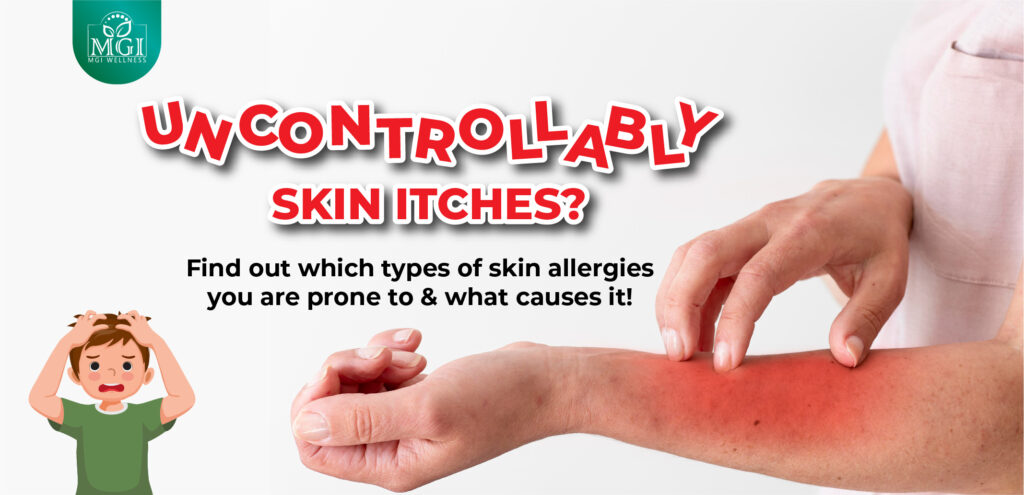Wellness
Uncontrollably skin itches? Find out which types of skin allergies you are prone to & what causes it!
An allergic reaction happens when the immune system has an unusual reaction to a harmless substance as their function is to find any foreign substances (viruses and bacteria) and get rid of it. But people with skin allergies have an over-sensitive immune system which can develop allergic skin rashes and other conditions due to the substances that cause the allergic reactions. This is because, when we encounter with something, our body thinks that it is dangerous and the immune system tends to overreacts, and releases antibodies to fight these off. In the end, the fight triggers symptoms like rash or swelling.
Common Skin Allergies
Eczema
Eczema, also commonly called atopic dermatitis, (1) is the most mutual skin rashes especially in children. It affects up to 20% of children and 10% of adults. (2) Eczema thought to be due to leakiness of the skin barrier, which causes it to dry out and become prone to irritation and inflammation. It typically results in dry, sensitive skin and may experience red itchy patches especially on the inner aspects of the elbow, in the back of the knee as well as on the cheeks, neck, wrists and ankles. Eczema can come and go over time, but the flare-ups may itch severely.
Contact dermatitis
Contact dermatitis (1) is a reaction that appears when the skin comes in direct contact with an irritant or an allergen. If having any red itchy bumps on the skin, especially at the site of contact with some potential irritant or allergen, that is experiencing with contact dermatitis. It is not infectious or lethal, but it can be very uncomfortable.
Hives
Hives, also recognized as urticaria (1) are an irritation of the skin happens when the immune system releases histamine which causes the small blood vessels to leak and results in appearance of red itchy bumps on the body as well as swelling within the skin. Swelling in the deep layers of the skin develop angioedema. Typically, it appears reddish and will turn white in the center when pressed. There are two conditions of urticaria called as acute urticaria and chronic urticaria. Acute urticaria normally lasts for no more than six weeks while chronic urticaria persists beyond six weeks and can last for many months or even years.
Angioedema
Angioedema (3) is swelling within the deep layers of the skin and frequently seen together with urticaria (hives). Angioedema happens many times in soft tissues for example the eyelids, mouth or genitals. Angioedema can be called ‘acute’ if the condition lasts only a short period of time such as for few minutes or hours while chronic recurrent angioedema is when the condition returns over an extended period of time and typically does not have any identifiable cause.
Hereditary angioedema (HAE)
Hereditary angioedema (HAE) (3) is a serious genetic condition that involve swelling in various parts of the body including hands, feet, face, intestinal wall and airways which are rare. It is important to go and meet a specialist or doctor because it does not response to any treatment with antihistamines or adrenaline.
Sign & symptoms of skin allergies
- Rashes
- Redness
- Itching
- Dry
- Cracking
- Scaly skin patches
- Bumps
- Blisters
- Swelling
- Burning
Causes of skin allergies/ Exposure to allergens
- Nickel (metal used in jewelry, makeup, lotions, soap and shampoos)
- Sunscreens/ creams/ medications that put on the skin
- Fragrances
- Cleaning products (bleach and detergents)
- Latex (plastic gloves and ballons)
- Chemicals (rubbing alcohol and solvents)
- Airborne substances (dust and pollen)
- Food
- Temperature (too cold or too hot)
- Plant (poison ivy and oak)
Test for allergies
Skin tests
Allergy skin testing is a gold standard and is used together with the medical history to seek out exactly what things of an individual is allergic to. Skin tests give out fast results and usually cost less than allergy blood tests. Skin tests also are well tolerated and rarely will cause a more serious allergic reaction after finished it. Some medicines (like antihistamines) can disturb the skin testing, so ask the doctors to see if have to stop taking any medicines before the test. (4)
Skin prick (scratch) test: It is the most common allergy test by using a thin needle to prick the skin on the forearm or back of the body with 10 to 50 different potential allergens or place droplets of potential allergens at different spots onto the skin and use a device to scratch and lightly puncture the area, so that the liquid can enter the skin. Any reactions such as redness, rash or round spots typically occur within 15 to 20 minutes at the sites of exposure if allergic to any allergens. Airborne allergies, food allergies and penicillin allergies are using this test to check.
- Intradermal skin test: This test of allergies usually done if skin prick test results are inconclusive. Using a tiny, thin needle to inject small amounts of the allergen into the outer layer of the skin (epidermis). Then watch the site for any reaction. This test checks allergies of airborne irritants, medications and insect stings.
- Patch test (T.R.U.E. TEST): (5) This test determines the cause of contact dermatitis by places drops of an allergen onto the skin on the arm and covers the area with a bandage or apply a patch (bandage) that contains the small amounts of specific allergens on for 48 to 96 hours. After that, the bandage will be removed to check the skin for a rash or other reactions.
Blood tests
Blood testing involves a single needle prick to take the blood sample and sends a sample of blood to a lab. The lab will add on allergen to the blood sample and measures the levels of IgE antibodies in it. However, it takes an extended time to get the results and quite pricy than skin tests. Blood tests also can have a higher rate of false-positive results.
In conclusion, if the skin allergy really bothers everyday life or hangs around for more than few weeks, consider to take supplements or get a medical care from doctor/ specialist, any which can help to feel better. Because skin allergies can lead to a life-threatening allergic reaction called anaphylaxis, even though in rare cases.
References
- Pawankar R., Canonica G. W., Holgate S. T., & Lockey R. F. White Book on Allergy. World Allergy Organization (WAO). 2011.
- Tan W. F., Voo S. Y., Sulaiman N., & Robinson S. Psychosocial burden of patients with atopic dermatitis at two tertiary referral centres in Malaysia. Med J Malaysia. 2021 Sep; 76(5): 643-652.
- Memon R. J., & Tiwari V. Angioedema. StatPearls Publishing LLC. 2021 Aug. Retrieved from: https://www.ncbi.nlm.nih.gov/books/NBK538489/
- Allergy testing – skin. Medline Plus. 2021. Retrieved from: https://medlineplus.gov/ency/article/003519.htm
- Nelson J. L., & Mowad C. M. Allergic Contact Dermatitis: Patch Testing Beyond the TRUE Test. J Clin Aesthet Dermatol. 2010 Oct; 3(10): 36-41.
Health Food



Charming phrase
Thanks for the post. Will read on…